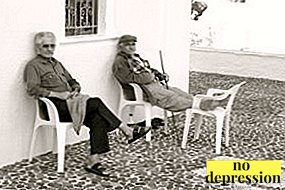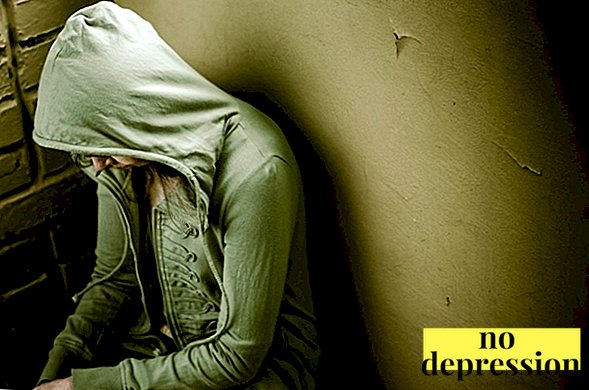The development of the human psyche is carried out continuously.
It is affected age changes, the events surrounding people and the actions of the individual.
Experts identify several periods, each of which has certain features.
What it is?

Age psychology is called branch of psychological sciencewhich studies the facts and patterns of human development.
The age dynamics of his psyche is studied, the mechanisms and driving forces of this process are investigated.
Experts identify the signs different periods of development, transitional stages.
The age-related psychophysiology is a section of science, within which scientists explore the relationship between the age-related physical changes of the body and the human psyche.
Experts believe that changes in physiology affect the psyche of the individual and his perception of himself, lead to anxiety and feelings, leave an imprint on his mental state.
Object study for scientists is a man. They are interested in his evolution during life, changes in mental state and worldview.
They are convinced that the individual's health outlook, his behavior, opinion change every year. He grows, gets experience life and professional, is becoming more versatile, wise. The events that occur in his life, also affect his condition.
What is studying like science?

This branch of scientific knowledge is studying periodization of mental development in ontogenesis.
For scientists it is important to identify patterns of certain processes, personality changes in certain conditions and circumstances.
Installed mental function norms, revealed deviations and disturbances in the course of certain mental processes.
For science, development matters both child and adult human, because each age is characterized by certain physiological and psychological changes.
The subject of this branch of science are age periods of progress, the causes and processes of transition from one stage to another. The growth rate and duration of the stages are also important.
For each person, these stages differ in duration rates. At one they can be quickly replaced, and at another they slow down a lot.
Who compared the theory of mental development?

This issue has been studied, analyzed and continues to be considered by many scientists.
Various ideas and theories are being advanced:
- L.S. Vygotsky, P.Ya. Halperin they say that the development of the psyche is the process of mastering a person by it. This process is associated with the evolution of human consciousness. Practical activity in the process of life affects the rate of maturation of the individual. External processes and internal interconnected, lead to continuous progress, improvement of the human psyche.
- S.L. Rubinstein, K.A. Abulkhanova-Slavskaya view this process as a complex change. This is a transition from one stage to another, from one stage to another. Steps are replaced throughout life, lasting a different amount of time.
- V.V. Zenkovsky I am convinced that this process is connected with the spiritual principle. Relations in society, mental state have a direct impact on the internal changes of a person. Changes can be both positive and negative. It all depends on the specific situations surrounding the individual.
These scientists have made a great contribution to the study of this science and its aspects. Their theories are different from each other, but are confirmation of previously put forward hypotheses and assumptions.
Basic concepts briefly
The basic concepts of this section of science are:
| Term | Definition |
| Phylogenesis | The origin of species, their evolution, starting with the simplest organisms and ending with man. |
| Ontogenesis | This is the individual development of the individual, from conception to the end of life. |
| Age | Stage of evolution of the individual in ontogenesis. |
| Chronological age | Indicated in the passport of the person. Starts from the date of birth. |
| Biological age | It can deviate from chronological, it shows how well the body is preserved, whether age-related changes are strong. Biological age is rising due to bad habits, diseases. Decreases due to a healthy lifestyle, slowing the process of maturation, aging. |
| Psychological age | It is determined by relating the mental improvement of the individual and the average statistical symptom complexes. |
| Determinism | This is the dependence of psychic phenomena on the factors generating them. |
Branches
Branches of this scientific knowledge are:
- Child psychology. We study the development of children, the formation of a child's personality, the formation of basic processes. Scientists find out how a child grows and grows, how he acquires the features of an adult, how he goes through what difficulties and crises, how they affect him.
- Youth. Considered a senior adolescence, its crises and changes.
The main focus is on self-determination of a teenager, his goals and life positions. This process includes problems, crises, difficulties that a person overcomes.
He begins to realize that he is getting older, there is a responsibility with which to cope.
- Mature age. There are signs of maturity, the course of further development, the definition of the characteristics of a given age of a person. This is a long stage, which affects the individual by the emergence of a sense of responsibility not only for his life, but also for the lives of children, and even grandchildren.
- Geronthopsychology. Scientists identify the signs and causes of aging, decline in activity, weakening resistance, reducing motivation to perform a particular activity.
 The individual no longer seeks to change something, stops development, he wants to be more alone with himself, to think about past years and to analyze the actions taken.
The individual no longer seeks to change something, stops development, he wants to be more alone with himself, to think about past years and to analyze the actions taken.

Each of these industries continues to be studied, complemented by new facts and information. Within their framework there are studies that help to advance in the consideration of these industries.
Main tasks
The main tasks that this section of science sets itself:
- Study of the age dynamics of mental processes. It is important to identify the properties, especially the dynamics, to know its pace and speed of development.
- Determination of the stages of ontogenesis. Scientists identify these stages, distribute them in turn, associate with a certain age.
- Differential psychological differences are identified. These include gender and age and typological properties of the individual. Experts set a goal to classify them, to consider the pattern and the reasons for the development of differences.
- Age crises. Scientists not only recognize crises, but also try to help individuals during such periods.
They create special methods of treating crises, develop ways to prevent extreme crises to alleviate the human condition.
Research methods

Modern research methods are quite diverse.
They help to study the whole picture, to understand the smallest features of these processes. The methods are:
- Observation. Scientists observe the subjects in various life situations, draw conclusions about certain results. seek to identify individual characteristics.
- Experiment. During the experiment, the subjects perform various tasks, or show how to cope with situations. This method shows how a person behaves, reveals features of his psyche.
- Slice Method and Comparative Method. Matched several individuals. They can be both the same age and different. This allows for certain conclusions.
- Testing. A person performs a test, the results of which scientists get the information they need for further studies.
Tests help to understand what difficulties a person is experiencing, whether he is going through a crisis stage, whether something is troubling her.
- Chatting, questioning. In the course of a conversation with a person, while studying his questionnaire, it is also possible to get to know him better, to reveal the distinctive features, peculiarities of personality.
- Product analysis. It can say a lot about a person, because activity has a strong influence on the formation of personality.
Relationship with other sciences

Developmental psychology is closely related to other sciences:
- Psychophysiology. Connects external and internal changes of a person. Physiology, aging and psyche are taken into account.
- Genetic psychology. He says that certain psychological traits are transmitted from parents to children, determine the characteristics of the child, his behavior, preferences.
- Differential Psychology. Attempts to identify the characteristics of each individual, the pace of its development.
- Pedagogical psychology. We consider the processes of education and training, creating the most effective ways.
- Social Psychology. We study changes in society, the behavior of a certain age group of people, their relationships.
- Medical psychology. Identifies deviations in the psyche and human behavior from the existing norm.
Specialists are trying to understand what causes deviations, when exactly it is necessary to take measures to eliminate deviations in the process of treatment.
Literature
Many books have been written on this topic. The most famous are:
- B.S. Volkov "From birth to school";
- L.F. Obukhov "Age-related psychology";
- K.O. Kazan "Children's and age psychology";
- V.S. Mukhina "Developmental psychology. Phenomenology of development";
- L.I. Bozovic "Personality and its formation in childhood";
- F. Rice, C. Doldin "Psychology of adolescence and youth".

This literature considers questions of age psychology, describes in detail the thematic terminology.
These books will be useful both for general development and in the study of this science for professional development.
Developmental psychology includes many aspects, features. it huge section of scientific knowledgewho studies the issues of maturation, human evolution. Scientists consider not only the processes of growing up, but also crises that occur at different ages.
Briefly about the emergence of age psychology in this video:

 The individual no longer seeks to change something, stops development, he wants to be more alone with himself, to think about past years and to analyze the actions taken.
The individual no longer seeks to change something, stops development, he wants to be more alone with himself, to think about past years and to analyze the actions taken.

